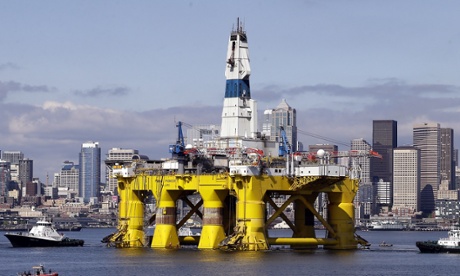The world’s five largest listed oil companies are expected to reward their investors with record payouts of more than $100bn (£79bn) for 2023 against a backdrop of growing public outrage at fossil fuel profits.
The five “super-majors” – BP, Shell, Chevron, ExxonMobil and TotalEnergies – showered shareholders with dividend payments and share buybacks worth $104bn in the 2022 calendar year, according to the Institute for Energy Economics and Financial Analysis (IEEFA).
The bumper payouts followed a year of record profits for big oil and gas companies after Russia’s invasion of Ukraine upended global energy markets, triggering a rise in the international price of Brent crude and record gas prices across Europe.
Financial analysts at IEEFA said the companies were likely to pay even greater shareholder distributions this year despite weaker commodity market prices leading to lower profits. The payouts will also follow a year that is expected to have been hotter than any other on record, with the climate emergency leading to a series of extreme weather events.
Trey Cowan, an analyst at the IEEFA, said: “At the current pace of distributions via share buybacks and dividends, these five super-majors could set a record for distributions to shareholders in 2023, topping the $104bn spent during the 2022 calendar year.”
Shell angered climate campaigners in November by setting out plans to pay shareholders at least $23bn in rewards this year, despite falling profits. The sum is more than six times the amount Shell planned to spend on renewable energy last year.
Shell’s investor windfall follows one of the biggest annual profits in UK corporate history for 2022 when the oil company revealed profits of $40bn but weaker commodity market prices in 2023 mean its full-year earnings are expected to be lower.
BP used its second-quarter results last year to tell shareholders to expect a 10% dividend raise in 2023, well above its initial guidance. The company had promised to raise the dividend by 4% each year and buy back about $4bn of shares, assuming the oil price was about $60 a barrel, but over the previous four quarters BP had repurchased $10bn of shares and increased its dividend by 20%. The handouts were particularly surprising after the company reported a deeper-than-expected profit slump. They were welcomed by investors, amid concern among some about the plans of the former chief executive Bernard Looney to “reimagine” BP as a net zero energy company by 2050.
Oil companies continue to offer generous shareholder handouts as investors face growing pressure to divest their shares. Protests targeting oil company AGMs and conferences have become increasingly disruptive in recent years as campaigners demand more ambitious climate action.
They have also faced hostility from campaign groups that have accused the companies of profiting from Russia’s war while millions of households have been plunged into a cost of living crisis driven by high energy costs.
Alice Harrison, a campaigner at Global Witness, said: “The global energy crisis has been a giant cash grab for fossil fuel firms. And instead of investing their record profits in clean energy, these companies are doubling down on oil, gas and shareholder payouts.
“Yet again millions of families won’t be able to afford to heat their homes this winter, and countries around the world will continue to suffer the extreme weather events of climate collapse. This is the fossil fuel economy, and it’s rigged in favour of the rich.”
Some green groups believe lucrative shareholder rewards are being used to distract investors from the public backlash against the oil industry, and a terminal shift in government policies away from fossil fuels.
But Dieter Helm, a professor of economic policy at the University of Oxford and a former government adviser, believes the payouts suggest the industry remains confident about its future profitability.
Helm used his 2017 book Burnout: the Endgame for Fossil Fuels to set out how the oil industry might respond to the existential threat of climate action. In a “harvest and exit” strategy companies would probably wring out as much value for their shareholders as possible, while winding down their future fossil fuel spending, he suggested.
But the climate agenda is unlikely to be playing a role in recent record shareholder paydays, he said. “For this to be the case you would have to believe that the energy transition is happening, and that demand for fossil fuels is going to fall. These companies are investing a huge amount in new projects, and they’re handing out bigger dividends because they are confident that they’re going to make big returns. And when we look at the state of our current climate progress, who’s to say they’re wrong?”
The oil industry’s record investor payouts have been largely buoyed by a sharp increase in share buybacks, according to analysts at S&P Global Market Intelligence (SPMI), which plays some role in future-proofing oil company payouts.
Share buybacks allow companies to share a surge in profits with investors without the long-term commitment of a change to the dividend policy. They also help to reduce the number of shares in the market, which would make future dividend policies “cheaper” to fulfil.
“In the US, Chevron leads a $75bn repurchase programme, followed by ExxonMobil’s $50bn. In Europe, Eni and Equinor have massively increased buybacks, up to 20% of cashflows from operations, albeit dividends remained as their priority. We forecast Shell and BP to allocate 15-18% of cashflow to dividends and about 25% to buybacks in 2024,” SPMI said.
The analysts expect the oil and gas industry to relinquish its position as the sector that pays the biggest dividends in 2024, dropping to second place behind banks.
The IEEFA’s Cowan says: “The [oil industry] is beginning to empty its war chest used to pay shareholders faster than they can replenish it. Future distributions to shareholders of these companies appear likely to fall and not continue to ascend.”











